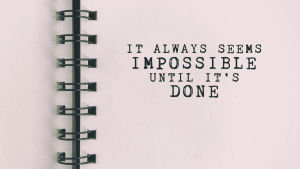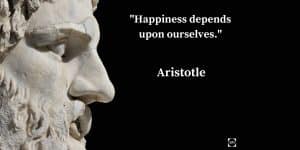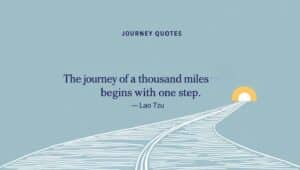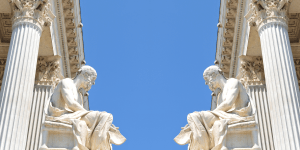Plato, one of the greatest philosophers in Western history, was a student of Socrates and a teacher to Aristotle. His ideas have profoundly influenced philosophy, science, politics, and ethics, leaving an indelible mark on the foundations of Western thought.
Born in ancient Greece around 427 B.C., Plato’s writings delve into subjects like justice, love, knowledge, and the nature of the human soul. His profound insights resonate across centuries, presenting philosophical frameworks that remain surprisingly relevant in today’s complex world.
Why does Plato’s wisdom endure through centuries? Perhaps it’s because his teachings go beyond abstract thought; they explore the fundamental questions of human existence, offering timeless advice on understanding ourselves and the world around us.
From encouraging the pursuit of knowledge to the importance of love and justice, Plato’s quotes encapsulate principles that can guide us through modern-day challenges.
Quotes on Knowledge and Wisdom
For Plato, knowledge and wisdom were not only goals in themselves but the foundation for a meaningful life. In his view, knowledge went beyond acquiring facts—it involved a deeper understanding of truth, a pursuit of what is real and just.
He believed that wisdom arises when we move beyond mere opinions to seek a higher understanding of existence.For more on the nature of wisdom itself, Philosophy Now offers a thought-provoking perspective on What is Wisdom?.
Quote 1: “Knowledge without justice ought to be called cunning rather than wisdom.”
This Plato quote reminds us that knowledge alone does not make us wise. In Plato’s view, true wisdom integrates justice and ethics; it’s about using our knowledge responsibly and for the good of all. In today’s world, where misinformation is common and opinions are often mistaken for facts, Plato’s words underscore the importance of pursuing knowledge with integrity.
Application Today:
- Critical Thinking: In an age dominated by information overload, critical thinking is essential. Plato’s quote encourages us to discern fact from opinion and to seek knowledge that aligns with ethical principles.
- Social Responsibility: Whether in business, education, or personal life, knowledge should be used to benefit others, not manipulate them.
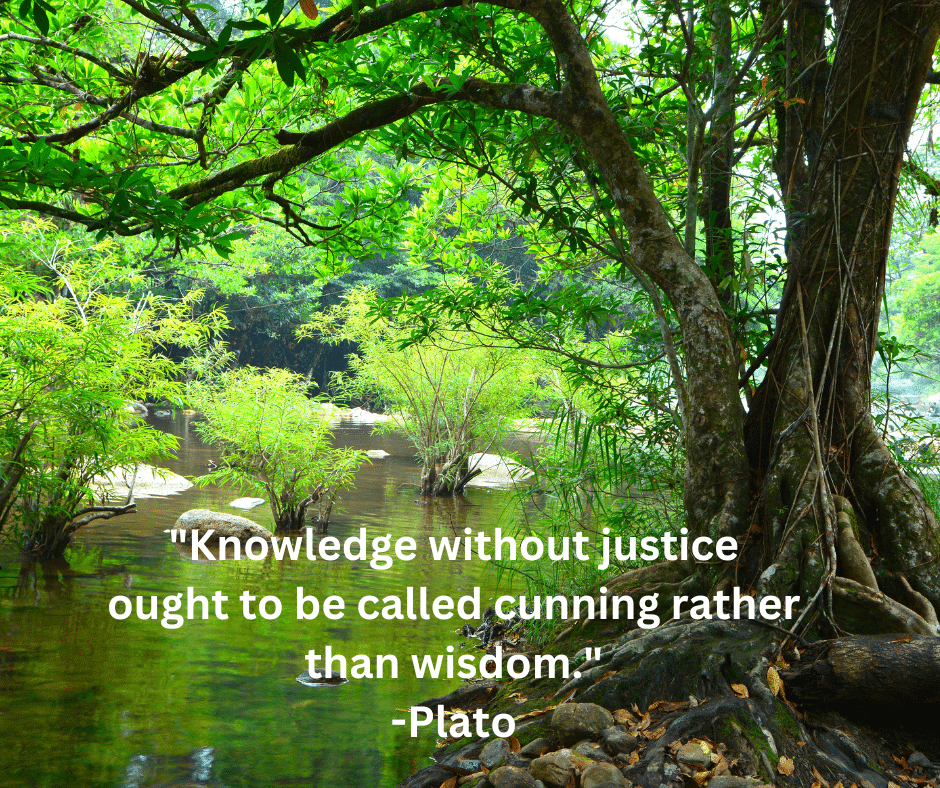
Quote 2: “The beginning of wisdom is the definition of terms.”
Plato emphasized that clarity is the foundation of understanding. To truly comprehend a topic, we must first define it accurately. This quote is a call to avoid ambiguity and seek precision in thought and language. It highlights the importance of starting with clear definitions before drawing conclusions, a practice that enhances communication and understanding.
Application Today:
- Effective Communication: In both personal and professional interactions, defining terms helps prevent misunderstandings and misinterpretations.
- Informed Decisions: By clarifying concepts before forming opinions or making decisions, we become better equipped to think critically and choose wisely.
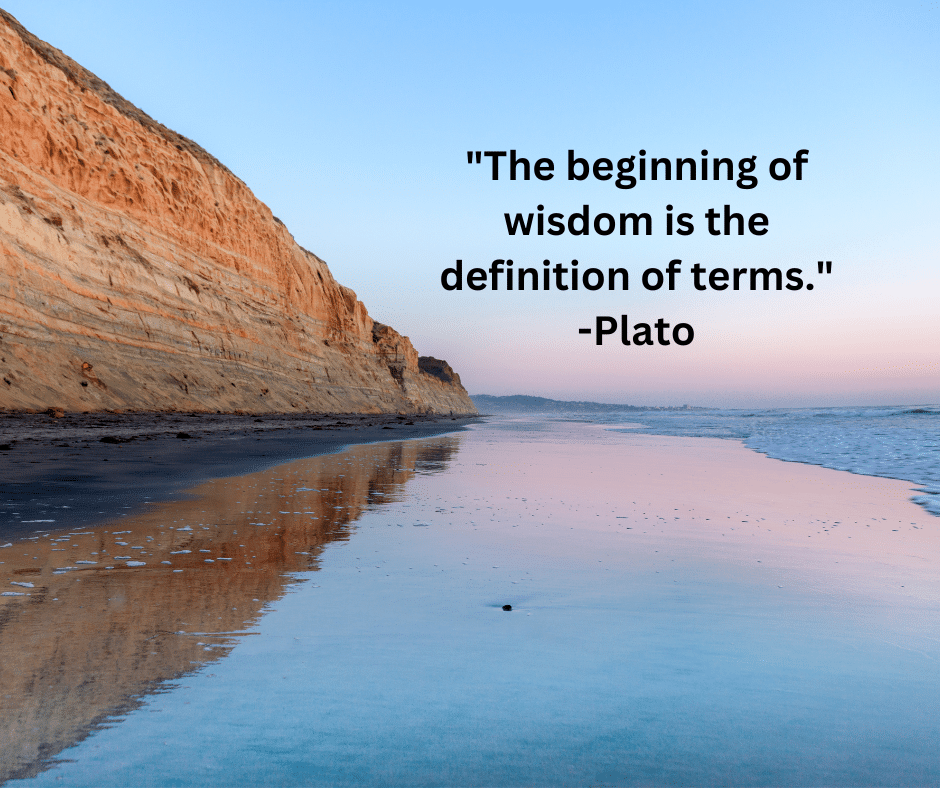
Quote 3: “Ignorance, the root and stem of every evil.”
Plato believed ignorance was the source of many social and personal issues. By fostering ignorance, we not only hinder our own growth but may also contribute to societal harm. This quote is a powerful reminder to continually seek knowledge, as ignorance can lead to prejudice, misunderstanding, and conflict.
Application Today:
- Personal Growth: Strive to educate oneself on diverse topics, from global issues to personal finance. Understanding different perspectives can help reduce prejudice and promote empathy.
- Social Awareness: Staying informed on social, political, and environmental issues allows us to be better citizens and make positive contributions to society.
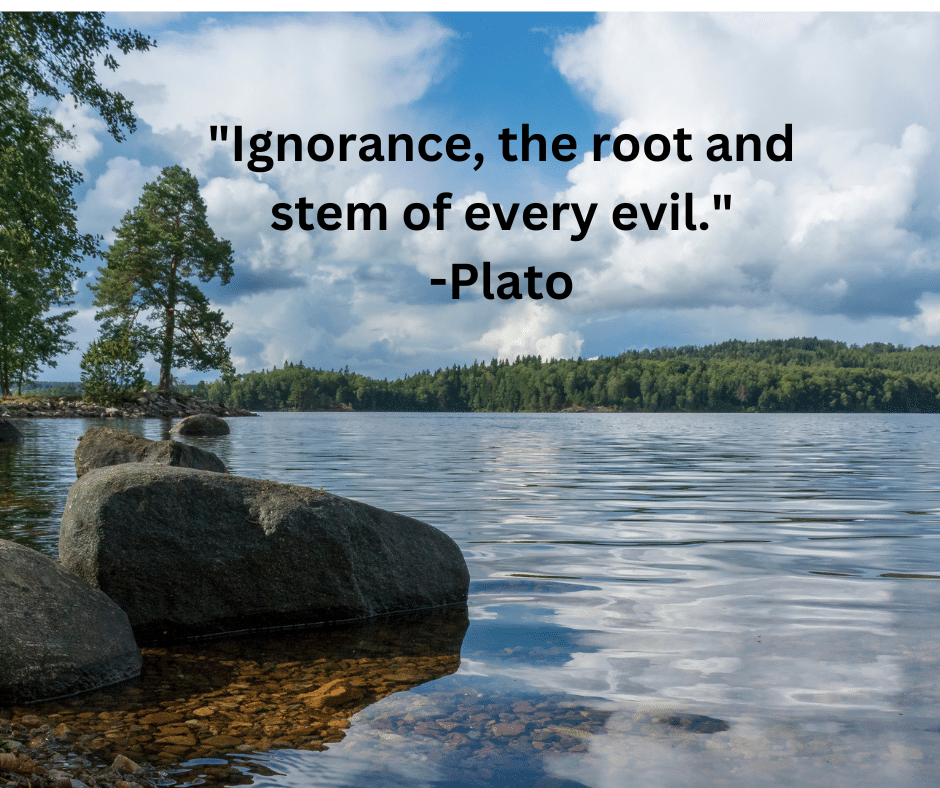
Plato’s Insights on Justice and Virtue
In Plato’s philosophy, justice and virtue are core principles for creating a fair and balanced society. Plato saw justice not merely as a legal standard but as an internal virtue that governs our actions, leading to harmony within both the individual and society. Through his famous works, such as The Republic, he explores these concepts, encouraging us to seek justice in our lives and strive for virtuous character.Additionally, explore virtue ethics further on Virtue Ethics at Ethics Unwrapped.
Quote 1: “Justice means minding your own business and not meddling with other men’s concerns.”
This Plato quote might seem unusual at first, but Plato uses it to convey the importance of individual responsibility. According to Plato, justice involves focusing on one’s own duties and responsibilities rather than interfering in others’ lives. In a society where people respect boundaries and concentrate on their roles, harmony and order can thrive.
Application Today:
- Respecting Boundaries: In both personal and professional relationships, respecting others’ boundaries leads to mutual respect and trust.
- Workplace Ethics: In the workplace, focusing on one’s responsibilities instead of critiquing others’ work creates a positive, productive environment.
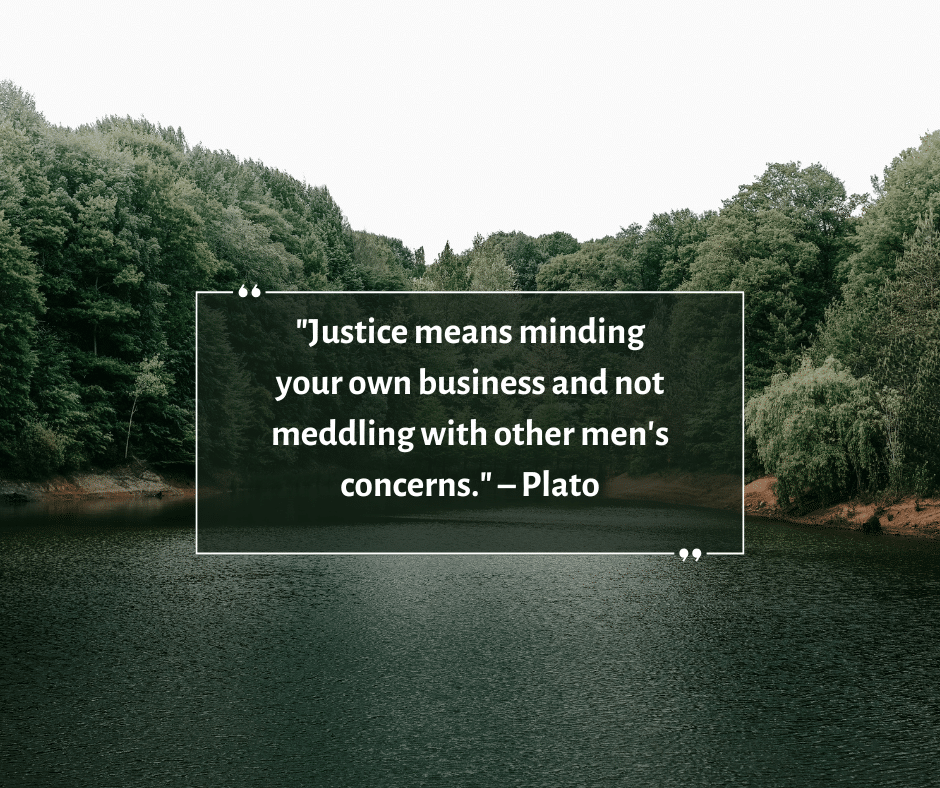
Quote 2: “The greatest wealth is to live content with little.”
Plato recognized that virtue lies in simplicity and contentment. Rather than seeking wealth or fame, true happiness comes from inner contentment and appreciation of life’s simple pleasures. In today’s consumer-driven society, this quote serves as a reminder that true wealth comes from inner peace and a life lived with purpose.
Application Today:
- Minimalism: The modern minimalist movement reflects Plato’s philosophy, emphasizing that a fulfilling life doesn’t require excessive possessions.
- Financial Responsibility: Contentment with what we have can reduce stress, help with budgeting, and lead to healthier financial habits.
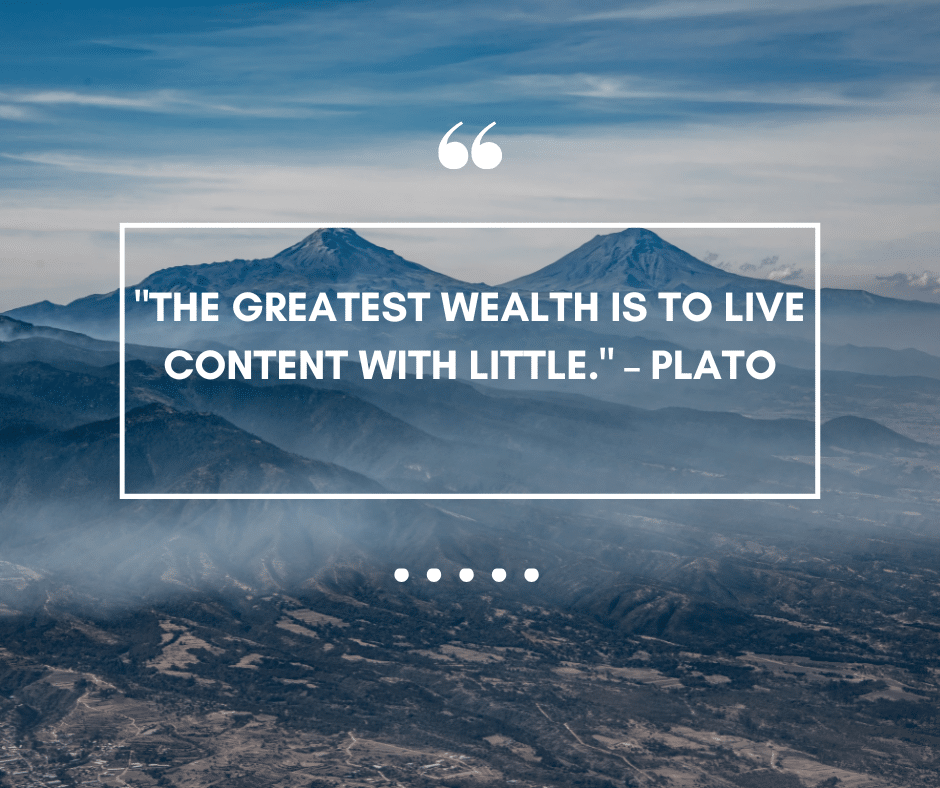
Quote 3: “Justice in the life and conduct of the State is possible only as first it resides in the hearts and souls of the citizens.”
Plato firmly believed that a just society is built upon the character of its citizens. Justice, according to Plato, starts from within, and only by cultivating virtue in individuals can a society attain true justice. This notion is relevant today, reminding us that social change requires individual accountability and moral integrity.
Application Today:
- Civic Responsibility: In democracies and communities, individual accountability and ethical behavior contribute to a fairer and more equitable society.
- Leadership: Leaders can inspire justice and fairness by embodying these qualities themselves, setting an example for others to follow.
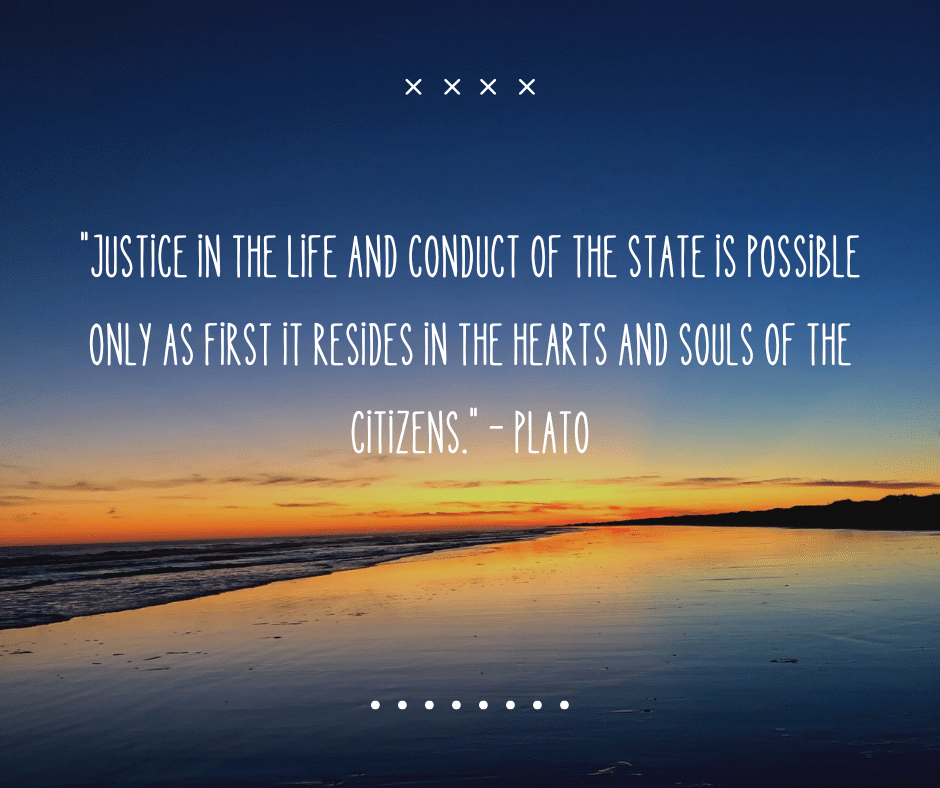
Quotes on Love and Relationships
Plato’s exploration of love goes beyond romance; he investigates the nature of human connection, affection, and the soul’s longing for unity. His reflections, particularly in works like The Symposium, offer a profound understanding of love as a powerful force that drives human behavior and shapes personal development.
Quote 1: “At the touch of love, everyone becomes a poet.”
This poetic statement expresses Plato’s belief in the transformative power of love. He suggests that love has the ability to elevate our thoughts and inspire creativity. Under the influence of love, people often see the world with renewed wonder, and even the simplest moments seem profound. Plato’s words remind us that love, in all its forms, can inspire self-expression and personal growth.
Application Today:
- Creativity in Relationships: Whether through art, writing, or shared activities, love inspires people to express themselves and connect in meaningful ways.
- Mindful Appreciation: This quote encourages us to appreciate the small, beautiful moments in our relationships, allowing love to deepen our perspective on life.
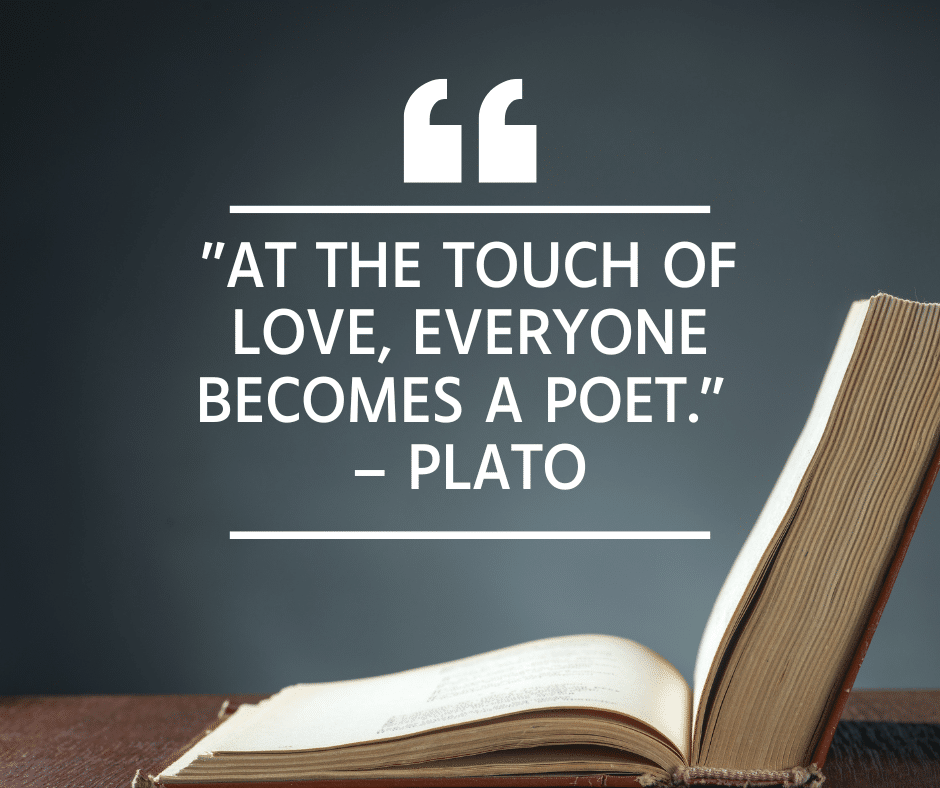
Quote 2: “Love is a serious mental disease.”
This quote shows Plato’s recognition of the overwhelming power that love can have on people. He sees love as a force that can alter one’s judgment, often leading to irrational thoughts and actions. While it may sound humorous, the underlying message is a reminder of the intense influence love holds over our emotions and decisions.
Application Today:
- Balance in Relationships: Recognizing the strong effect of emotions in love encourages us to approach relationships with both passion and mindfulness.
- Emotional Awareness: This quote can remind us to keep self-awareness in relationships, understanding when emotions may cloud judgment, and fostering healthy balance.
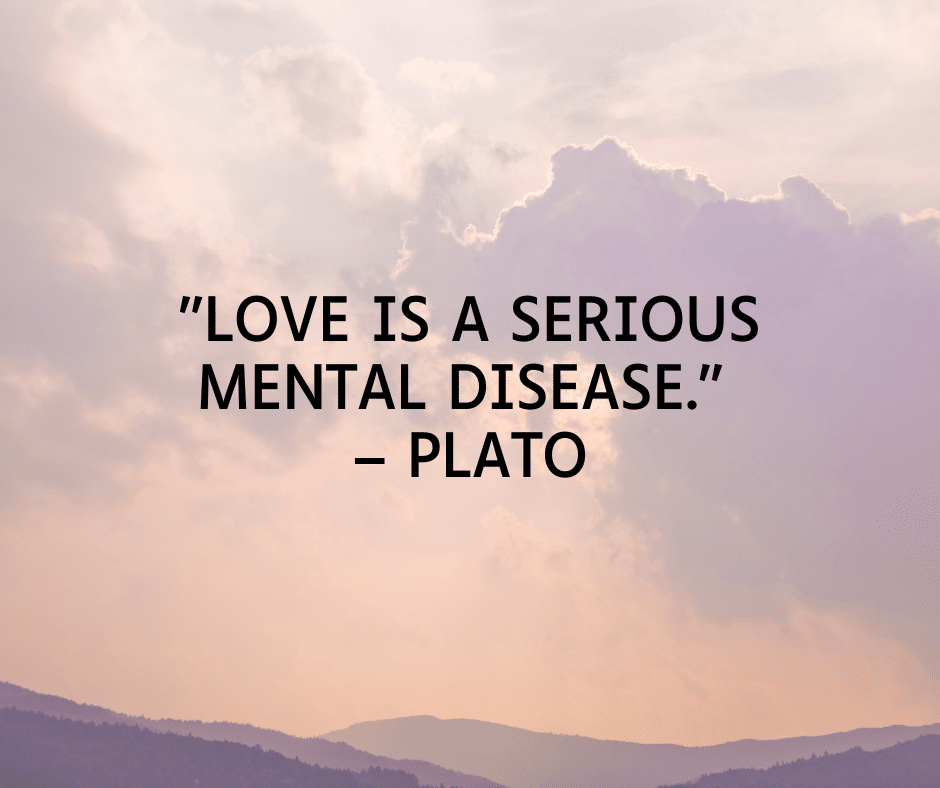
Quote 3: “He whom love touches not walks in darkness.”
For Plato, love is a source of light and enlightenment, bringing joy and meaning to life. This quote reflects his belief that love is an essential part of the human experience, enriching our lives with purpose and connection. To live without love, he suggests, is to miss out on one of life’s most profound experiences.
Application Today:
- Importance of Connection: This quote reminds us to cherish connections with friends, family, and partners, as they bring joy, support, and meaning.
- Self-Love: In addition to romantic love, practicing self-love and compassion can also be a source of light in our lives, fostering a positive mindset and resilience.

Plato on Politics and Governance
In The Republic, Plato discusses the ideal society and the qualities of a true leader. He envisioned a society governed by philosopher-kings—wise, selfless leaders dedicated to the well-being of the people. While we may not have philosopher-kings today, Plato’s reflections on governance and justice offer valuable insights into what makes a just society and the ethical responsibilities of those in power.
Quote 1: “The heaviest penalty for declining to rule is to be ruled by someone inferior to yourself.”
Plato observed that those most fit to govern are often reluctant to seek power, whereas those eager for power may lack the wisdom to wield it effectively. This quote speaks to the idea that capable people should step up and assume responsibility, rather than leaving it to those with less scrupulous intentions. In modern times, this can serve as a reminder of the importance of ethical leadership and civic responsibility.
Application Today:
- Encouraging Ethical Leadership: This quote highlights the need for competent, ethical leaders in positions of authority to ensure fair governance.
- Civic Engagement: It can also inspire citizens to be active in politics, ensuring that leadership is entrusted to qualified individuals rather than those motivated solely by power.
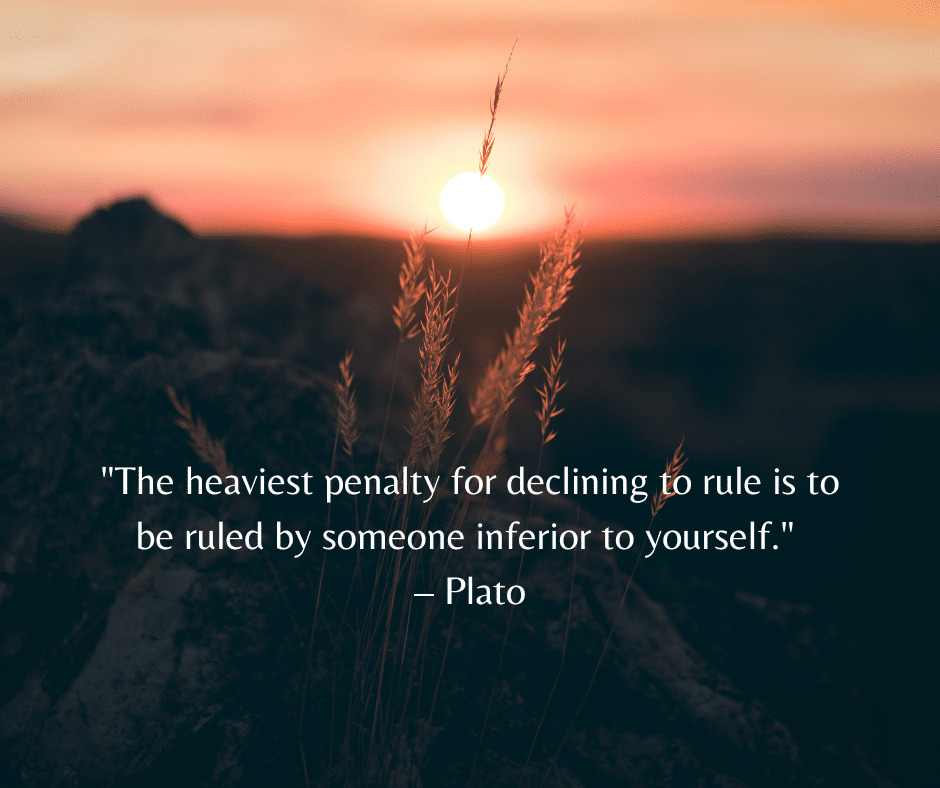
Quote 2: “Democracy… is a charming form of government, full of variety and disorder; and dispensing a sort of equality to equals and unequals alike.”
Plato was critical of democracy as he observed it in Athens, perceiving it as chaotic and prone to favoring popularity over expertise. His words caution against the potential pitfalls of governance that prioritizes short-term popularity over the long-term good. Although Plato’s perspective might seem critical, it reminds us of the need for balance, integrity, and informed decision-making in democratic systems.
Application Today:
- Informed Voting: Citizens in democratic societies should focus on informed voting, supporting leaders who prioritize long-term well-being over popularity.
- Maintaining Order in Governance: Governments can strive to provide structure, transparency, and thoughtful policy-making, balancing freedom with societal order.
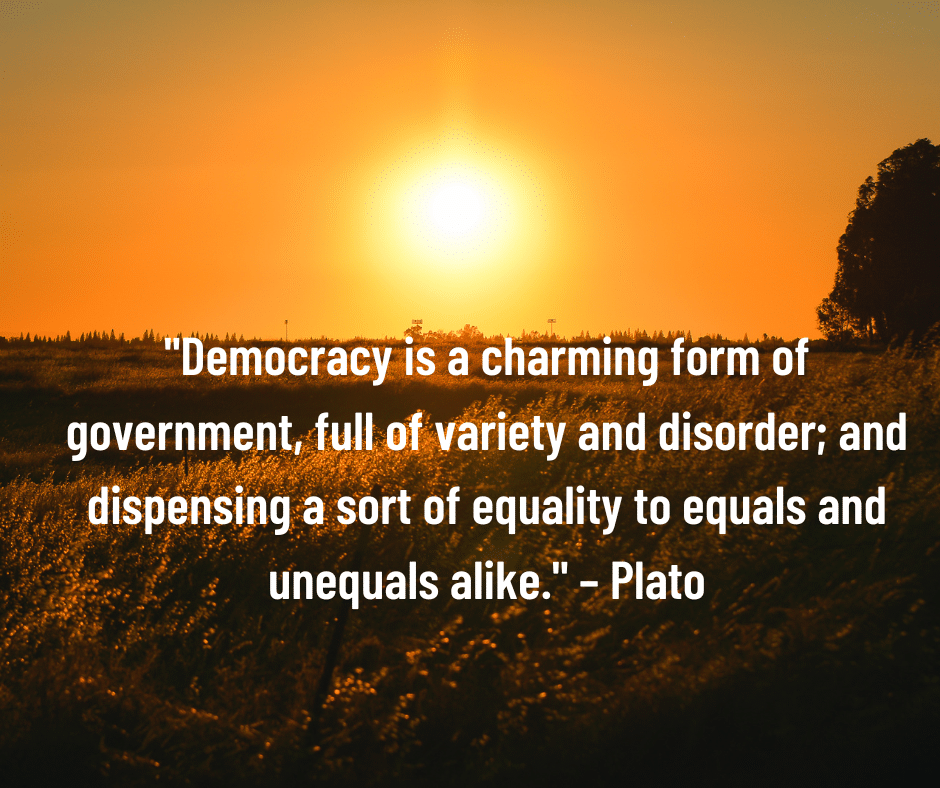
Quote 3: “Those who are too smart to engage in politics are punished by being governed by those who are dumber.”
Plato’s perspective on civic involvement is clear—if intelligent and wise individuals refrain from participating in governance, they inadvertently allow less competent individuals to take charge. This quote speaks to the responsibility that capable individuals have to engage in political life, ensuring that leadership is marked by wisdom and ethics.
Application Today:
- Promoting Civic Responsibility: This quote can inspire those with knowledge, skills, and ethical standards to be more involved in local and national governance.
- Educational Initiatives: Investing in education and civic awareness empowers people to make informed choices, leading to better governance for future generations.
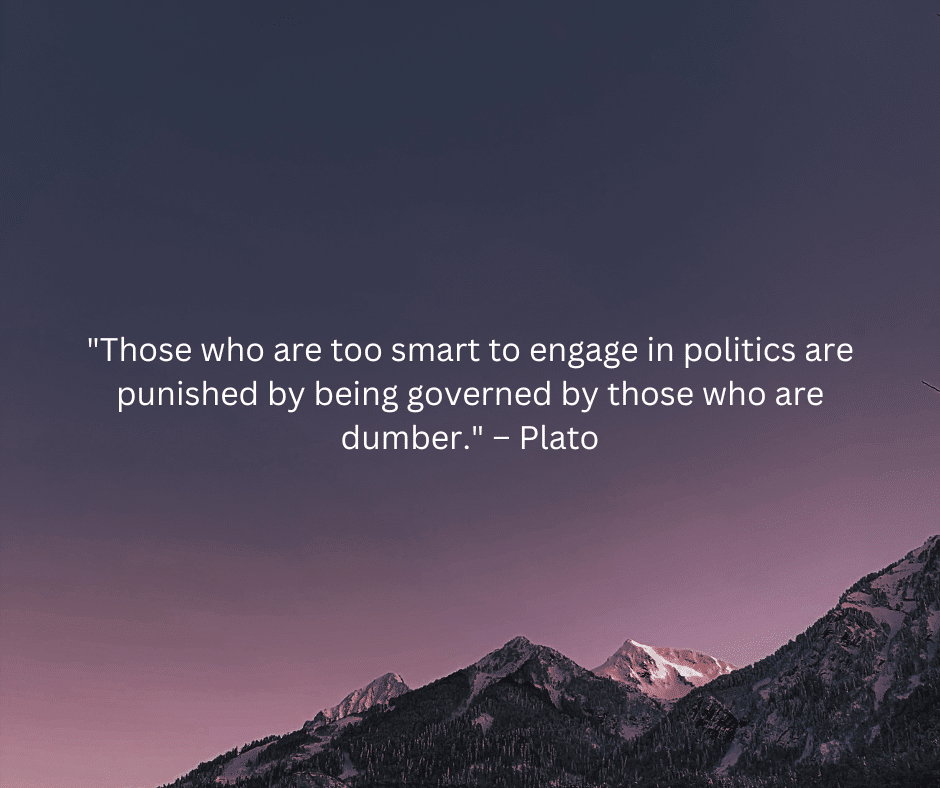
Quotes on the Soul, Life, and Existence
Plato’s philosophical inquiries extended beyond the visible world, probing the nature of the soul and our purpose in life. His ideas promote self-awareness and mindfulness, urging us to look beyond material reality to understand our deeper selves. These reflections can be particularly inspiring for those seeking personal growth and inner peace in today’s fast-paced world.
Quote 1: “The soul takes nothing with her to the next world but her education and her culture.”
In this quote, Plato emphasizes that material possessions do not define us; instead, it is our knowledge, virtues, and character that endure. According to Plato, cultivating the soul through education and ethical behavior is essential, as these are the qualities that remain with us. This perspective encourages lifelong learning and personal growth over the accumulation of wealth.
Application Today:
- Prioritizing Personal Development: Investing time in self-education, self-awareness, and ethical living provides long-lasting benefits, fostering resilience and inner peace.
- Spiritual Fulfillment: The quote encourages us to focus on inner growth, aiming for a balanced life that values wisdom over materialism.

Quote 2: “An unexamined life is not worth living.”
One of Plato’s most famous quotes, this statement underscores the importance of introspection. He believed that examining our choices, beliefs, and purpose in life is essential to living meaningfully. This quote serves as a call to avoid going through life on autopilot, instead fostering curiosity, self-awareness, and intentionality in our actions.
Application Today:
- Self-Reflection: Regular self-reflection practices, such as journaling or meditation, help us understand ourselves better and make mindful choices.
- Purpose-Driven Living: By questioning our goals, values, and actions, we can align our lives with our true purpose, leading to greater fulfillment.

Quote 3: “The body is the prison of the soul.”
Plato viewed the body as a temporary vessel for the soul, which he believed longed for a higher existence. This metaphor illustrates his belief that the physical world, including bodily desires and limitations, can distract us from our spiritual journey. In a modern context, this idea can be seen as a reminder to focus on the inner self and avoid being overly attached to superficial concerns.
Application Today:
- Mindfulness and Spirituality: Emphasizing mindfulness and self-awareness over materialism allows us to focus on inner well-being.
- Healthy Lifestyle Choices: Plato’s idea encourages us to use the body wisely, adopting healthy habits that nurture both physical and mental wellness, supporting the journey of the soul.
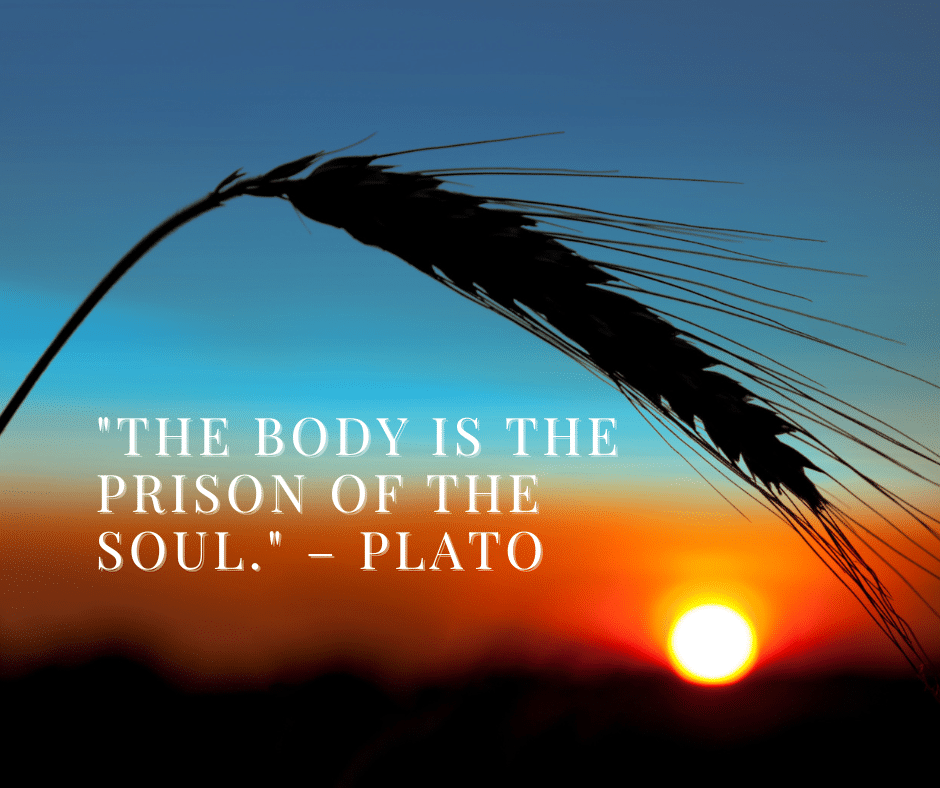
Education and Learning According to Plato
Plato viewed education as the foundation of a just and knowledgeable society. For him, learning was a lifelong journey that extended far beyond formal schooling. Through works like The Republic, he outlined his philosophy of education, emphasizing the importance of critical thinking, self-reflection, and the pursuit of truth.For an inspiring take on lifelong learning, check out Inc.’s article on Why Lifelong Learning Matters.
Quote 1: “Education is teaching our children to desire the right things.”
Plato believed that education is not just about imparting knowledge but also about shaping character and values. According to him, true education guides individuals to develop the wisdom to discern what is truly valuable in life. In today’s world, this quote encourages educators and parents to emphasize ethical and moral teachings, alongside academic instruction.
Application Today:
- Character Education: Modern education systems are increasingly incorporating character education, helping students develop empathy, responsibility, and a sense of purpose.
- Value-Based Learning: Focusing on holistic development—learning to value kindness, integrity, and critical thinking—helps foster well-rounded individuals.

Quote 2: “The direction in which education starts a man will determine his future in life.”
Plato emphasized that early education shapes an individual’s entire life. By instilling good values and critical thinking skills from a young age, we set a foundation that influences a person’s future decisions and success. This quote reminds us of the lasting impact of early learning and the importance of cultivating curiosity, resilience, and ethical awareness from the start.
Application Today:
- Early Childhood Education: This quote highlights the importance of investing in quality early childhood education, which lays the groundwork for lifelong learning and personal growth.
- Positive Role Models: Encouraging children to explore their interests and build confidence helps them develop a positive trajectory in life.

Quote 3: “Do not train a child to learn by force or harshness; but direct them to it by what amuses their minds.”
Plato understood that genuine interest and curiosity drive effective learning. Forcing knowledge onto someone rarely leads to a deep understanding, whereas engaging the mind with interesting and relevant material fosters a true desire to learn. This perspective remains relevant today, reminding educators and parents of the importance of cultivating an environment that makes learning enjoyable and engaging.
Application Today:
- Engaging Educational Methods: Interactive learning, hands-on activities, and creative teaching approaches can make learning enjoyable, helping students stay curious and motivated.
- Individualized Learning: Recognizing each student’s unique interests and strengths can help them develop a love for learning, promoting lifelong educational growth.
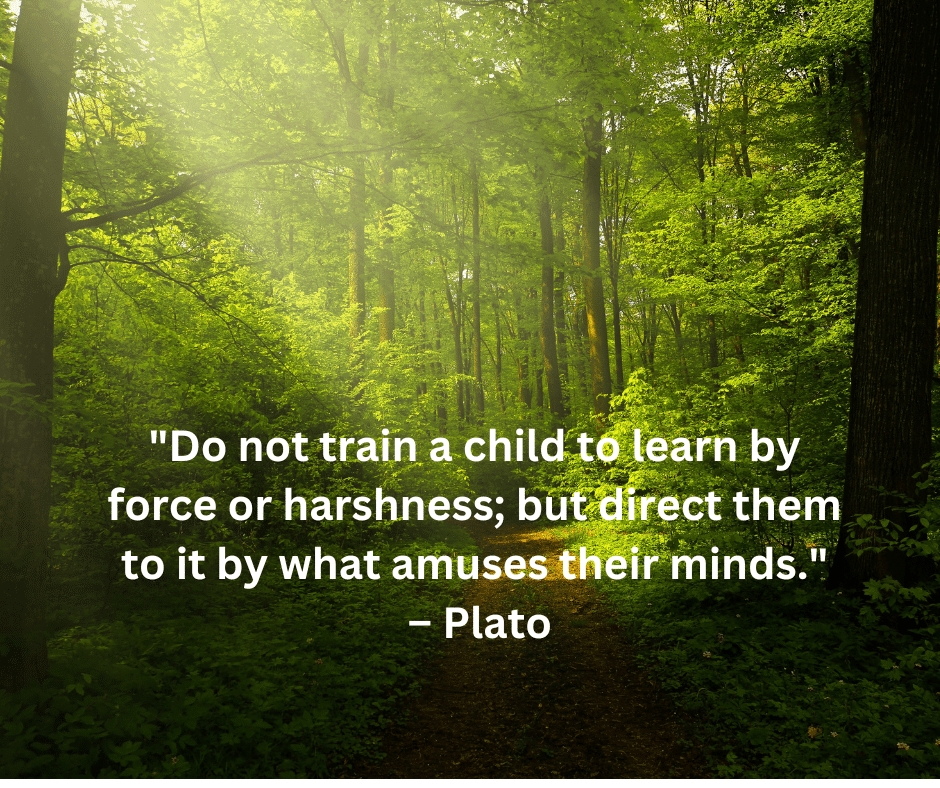
The Power of Dialogue and Reflection
Plato frequently used dialogues in his works, showcasing his belief that conversations and reflection are essential paths to understanding. For him, truth emerges not from isolated thinking but through exchange and introspection. These concepts emphasize the value of open-mindedness, self-examination, and a willingness to question assumptions—a lesson as relevant now as it was in ancient Greece.
Quote 1: “Wise men speak because they have something to say; fools because they have to say something.”
Plato emphasizes the importance of thoughtful speech over impulsive conversation. He believed that words should serve a purpose, conveying insights or constructive thoughts, rather than simply filling silence. In today’s world, where social media and instant communication sometimes prioritize quantity over quality, this quote reminds us to choose our words carefully and aim for meaningful interactions.
Application Today:
- Mindful Communication: Practicing mindfulness in conversations—whether online or in person—promotes a more thoughtful and respectful exchange of ideas.
- Quality over Quantity: This quote encourages us to prioritize meaningful contributions over constant chatter, focusing on depth rather than frequency in communication.
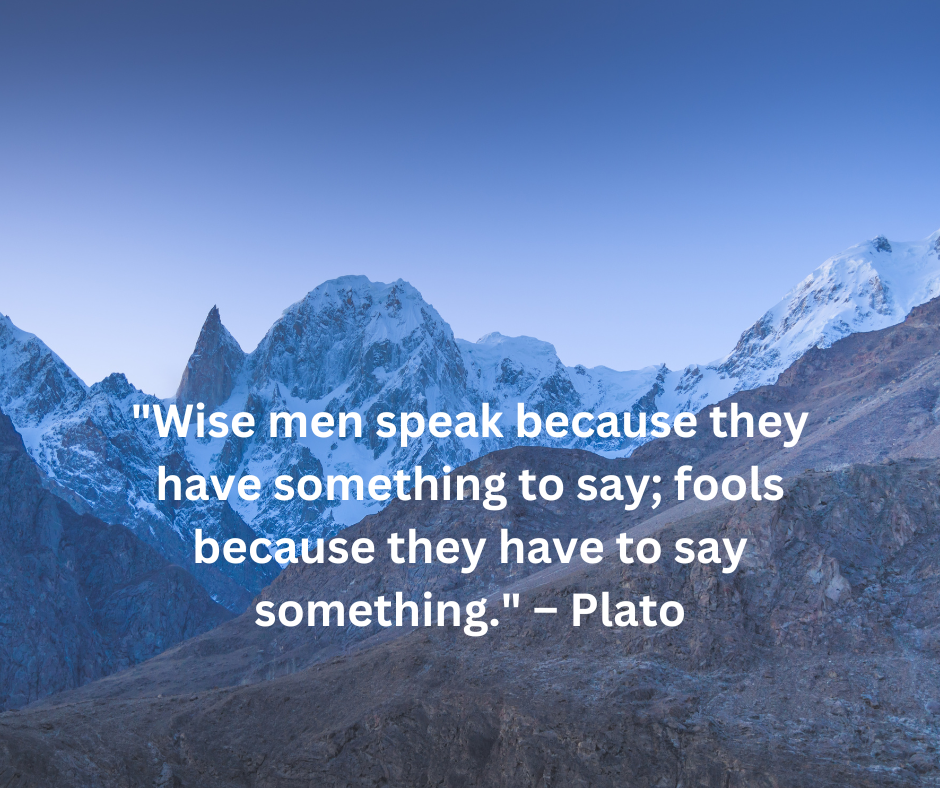
Quote 2: “Thinking: the talking of the soul with itself.”
Plato viewed thinking as an internal dialogue, where we converse with our own soul to understand deeper truths. This introspective process allows us to clarify our beliefs, examine our actions, and grow in self-awareness. Plato’s words remind us that self-reflection is essential for personal development and aligning our actions with our values.
Application Today:
- Self-Reflection Practices: Journaling, meditation, or even quiet moments of introspection can help us examine our thoughts and motives, fostering greater self-understanding.
- Mindfulness: This quote encourages us to practice mindfulness, paying attention to our inner dialogue and recognizing how it influences our emotions and actions.
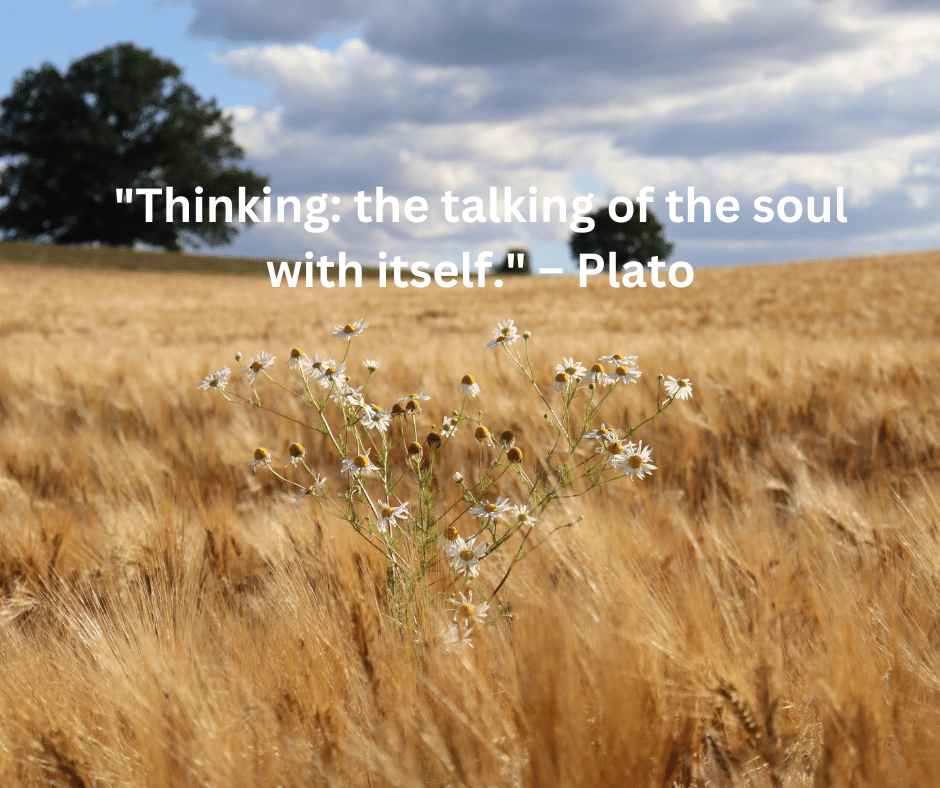
Quote 3: “We can easily forgive a child who is afraid of the dark; the real tragedy of life is when men are afraid of the light.”
Plato here suggests that true growth comes from confronting truth and self-awareness, even when it is uncomfortable. Just as a child fears the unknown, adults may avoid self-reflection, preferring ignorance over facing the reality of their actions and beliefs. This quote serves as a reminder to seek truth and understanding, even if it challenges our current views.
Application Today:
- Embracing Truth: Whether in our personal lives or societal issues, this quote reminds us to confront uncomfortable truths to foster growth and positive change.
- Personal Growth: By facing our fears, insecurities, and challenges, we can become more resilient and gain a deeper understanding of ourselves.

Conclusion: Timeless Wisdom for Today’s Challenges
Plato’s quotes carry a legacy of wisdom that transcends time. From love and justice to education and self-reflection, his insights offer valuable guidance on navigating life’s complexities with clarity, integrity, and purpose. In today’s fast-paced, often challenging world, Plato’s words remind us of the enduring importance of truth, virtue, and self-awareness. By embracing these teachings, we can build a life grounded in understanding, empathy, and continuous growth.
Plato’s wisdom endures because it speaks to universal truths about human nature, society, and the pursuit of meaning. As we reflect on these timeless quotes, we’re reminded that the principles he advocated remain as relevant today as they were in ancient Greece. His thoughts encourage us to seek knowledge, act with integrity, and remain curious, ensuring that we lead fulfilling, purposeful lives.
Frequently Asked Questions
Plato’s most famous quotes include:
- “The unexamined life is not worth living”
- “Knowledge is the food of the soul”
- “Love is a serious mental disease”
- “We can easily forgive a child who is afraid of the dark; the real tragedy of life is when men are afraid of the light”
Plato’s quotes remain relevant because they address universal human experiences and fundamental questions about life, knowledge, love, and justice. His insights into human nature, education, and society continue to resonate with modern challenges and personal development.
Plato commonly wrote about:
- Knowledge and wisdom
- Justice and virtue
- Love and relationships
- Politics and governance
- Education and learning
- The nature of reality and truth
You can apply Plato’s wisdom in modern life by:
- Practicing self-reflection and critical thinking
- Pursuing knowledge and continuous learning
- Developing emotional intelligence in relationships
- Engaging in civic responsibility
- Making ethical decisions based on principles
Plato’s quotes come from his various written works, including:
- The Republic – His most famous work on justice and society
- The Apology – Recording Socrates’ speech at his trial
- Phaedrus – Discussing love and rhetoric
- Symposium – Exploring different aspects of love
- Various dialogues documenting philosophical discussions

